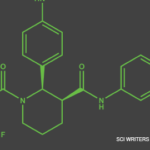Plasma Exchange
Plasma exchange has been used in addition to glucocorticoids and immunosuppressive agents, with mixed results, to treat patients with AAV. A retrospective, single-center series found no benefit for alveolar hemorrhage or glomerulonephritis, and a meta-analysis in the April 2011 issue of the American Journal of Kidney Diseases was inconclusive, Dr. Merkel said.4
“Controversy and clinical equipoise existed,” he added. “This led us to design and conduct the PEXIVAS trial.”
PEXIVAS was a two-by-two factorial, randomized, investigator-initiated trial that included 704 patients randomized in centers across Europe, North America, Asia and Australasia to receive plasma exchange or no plasma exchange; the second aspect of the trial compared the use of the usual schedule of high-dose glucocorticoids compared with a schedule that prescribed approximately half as much glucocorticoids. All patients also received immunosuppression with either cyclophosphamide or rituximab.
An article by Dr. Merkel and colleagues published in the Feb. 13, 2020, issue of the New England Journal of Medicine reported the results of the PEXIVAS trial.5 Plasma exchange did not reduce the composite of mortality or end-stage renal disease, but the reduced-dose schedule of glucocorticoids was non-inferior to a “standard” dose and resulted in fewer serious infections.
“The results of PEXIVAS do not support the routine use of plasma exchange for induction of remission for patients with severe AAV, [but] do support the use of a reduced-dose schedule for glucocorticoids,” Dr. Merkel said. “These results will change the standard of care for patients with severe AAV.”
Novel Agents
Avacopan, formerly known as CCX168, is a novel, oral, small-molecule drug that is a selective inhibitor of the component C5a receptor (C5aR). A phase 2 trial published in 2017 the Journal of the American Society of Nephrology concluded that C5aR inhibition with avacopan was effective as a replacement for high-dose glucocorticoids in treating vasculitis.6
Avacopan was investigated further in ADVOCATE, an industry-sponsored phase 3 trial that involved 331 patients with active AAV who were all given either rituximab or cyclophosphamide, and randomized to receive avacopan with no glucocorticoids after the first few weeks or placebo and usual-dose glucocorticoids. Dr. Merkel shared the top-line results of the trial, which demonstrated that adding avacopan to either rituximab or cyclophosphamide allows for treatment of AAV with a minimized glucocorticoid regimen.7
Results showed disease remission at 26 weeks and sustained remission at 52 weeks compared with the standard of care, and patients taking avacopan had reduced glucocorticoid-related toxicity and significant improvements in quality of life and in renal function. The full results of the ADVOCATE study are expected to be published later this year by Dr. Merkel and colleagues.



